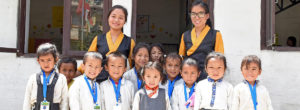Shree Mangal Dvip School
Country Nepal
Founder and Spiritual Lead Thrangu Rinpoche
Lineage Kagyu
Thrangu Tashi Yangtse Monastery
Namo Buddha, P.O.Box 1287
Kathmandu, Nepal
http://namobuddha.org/school.html
Contact
Phone: +977-1-491-5407
Email: [email protected]
Website: https://www.himalayanchildren.org/
YouTube: https://www.youtube.com/user/namothrangu
About
Shree Mangal Dvip has two campuses: the Boarding School, and the Branch School.
The Boarding School
Kathmandu, Nepal
Thrangu Rinpoche founded Shree Mangal Dvip School (SMD) in 1987 with the aim to provide free education for the children from the high Himalayas of northern Nepal, many of which are lacking even the basic human needs of access to clean water and food.
The SMD main campus is situated close to the ancient Buddhist stupa of Boudhanath (a UNESCO World Heritage Site), about 10 km northeast of central Kathmandu, Nepal. We offer nursery to grade 10 to over 500 students ranging from the age of five to early twenties.
The children are given a secular education enriched by instruction in the “lama language” (Tibetan) and Himalayan culture. Our classes are instructed in English and follow the current Nepal government school curriculum (math, science, English, Nepali, social studies and computer studies). Important to the foundation and aim of our school is that our students receive the teachings of the Buddha with the inclusion of daily prayer and meditation.
The Branch School
Thrangu Tashi Yangtse Monastery, Namo Buddha, Nepal
Currently 70 students and 12 teachers, from 1st until 9th grade. Education in Tibetan, English and Nepali, supplemented by complete training in religion and culture. Dharma-related talk every other week, lama dancing, ritual practice, chanting, playing instruments. In addition, also taking care of the environment: each week the members of the Thrangu Environment Club clean the monastery grounds.
When they complete the school program, in accord with each student’s intellectual ability and readiness, some enter the shedra; some begin ngöndro practice; and a few whose scholarship and conduct have been exemplary have the opportunity to become teachers for a few years.

